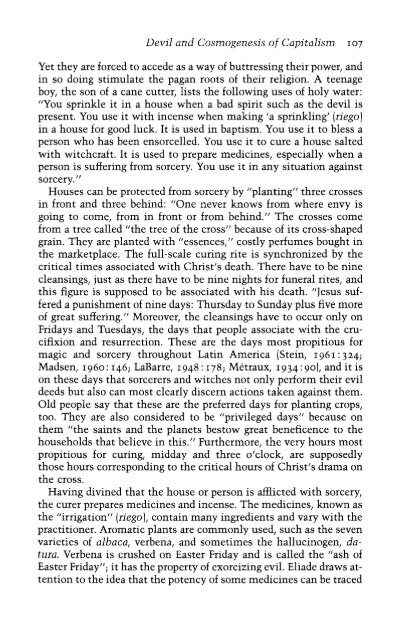The Devil and Commodity Fetishism in South America - autonomous ...
The Devil and Commodity Fetishism in South America - autonomous ...
The Devil and Commodity Fetishism in South America - autonomous ...
Create successful ePaper yourself
Turn your PDF publications into a flip-book with our unique Google optimized e-Paper software.
Slave Religion <strong>and</strong> Rise of the Free Peasantry 45<br />
Christianized slaves as more rebellious <strong>and</strong> as poorer workers than<br />
those not <strong>in</strong>doctr<strong>in</strong>ated <strong>and</strong> would pay less for them (S<strong>and</strong>oval,<br />
1956:198; cf., Bowser, 1974:79; K<strong>in</strong>g, 1939:16-17). Whites were not<br />
only dis<strong>in</strong>cl<strong>in</strong>ed to buy Christianized slaves but tried to prevent their<br />
conversion, at times tell<strong>in</strong>g them that baptism was bad. Accord<strong>in</strong>g to<br />
Jose Toribio Med<strong>in</strong>a, slave owners, reluctant to pay the costs of<br />
lengthy <strong>in</strong>quiries <strong>and</strong> penalties, encouraged their slaves to disappear<br />
if they were on the Inquisition's wanted list (1889). As a result, an underground<br />
African or quasi-African religion seems to have flourished,<br />
at least dur<strong>in</strong>g the early years, syncretized with ardent faith <strong>in</strong> the<br />
miracle powers of Christ <strong>and</strong> the sa<strong>in</strong>ts—powerful spirits who could<br />
be appealed to for earthly succor.<br />
In 1771 the Bishop of Popayan, capital of the Cauca region of southwest<br />
Colombia, compla<strong>in</strong>ed bitterly that his attempts to catechize<br />
the slaves <strong>and</strong> prevent their be<strong>in</strong>g worked on Sundays <strong>and</strong> feast<br />
days encountered the firm opposition of the slave owners. He believed<br />
that clerical m<strong>in</strong>e speculators were identify<strong>in</strong>g too closely<br />
with the exploiters of their slave flocks (K<strong>in</strong>g, 1939:217). <strong>The</strong> right of<br />
the slaves to rest on feast days, of which there was at least one a week<br />
<strong>in</strong> addition to Sundays, was hotly disputed by the Cauca m<strong>in</strong>e owners<br />
dur<strong>in</strong>g the eighteenth century. Yet, <strong>in</strong> a study of the health of slaves <strong>in</strong><br />
New Granada, David Lee Ch<strong>and</strong>ler concludes that for many slaves<br />
the Church's <strong>in</strong>sistence on rest days "must have . . . prolonged their<br />
lives" (1972:238). On these days they could also earn the wherewithal<br />
to buy their freedom, but many Cauca slave owners responded<br />
by reduc<strong>in</strong>g the food <strong>and</strong> cloth<strong>in</strong>g ration of the slaves. In these circumstances<br />
the feast days may have <strong>in</strong>cl<strong>in</strong>ed the slaves favorably toward<br />
the Church <strong>and</strong> added a religious rationale to their opposition to<br />
their masters.<br />
Priests were <strong>in</strong> short supply, <strong>and</strong> few gave much attention to Christianiz<strong>in</strong>g<br />
slaves. "As a result," writes Norman Meiklejohn, "many of<br />
Colombia's Negroes were blithely ignorant of Christianity's true<br />
mean<strong>in</strong>g <strong>and</strong> of its moral precepts" (1968:287,- cf., Pons, 1806, i: 160).<br />
Yet surely this "ignorance" cannot be expla<strong>in</strong>ed only by the shortage<br />
of priests. Black popular religion could hardly endorse slavery <strong>and</strong> all<br />
it implied, nor could the slaves rema<strong>in</strong> content with equality <strong>in</strong> God's<br />
eyes but not <strong>in</strong> their own. But only with the breakdown of the colonial<br />
hegemony <strong>and</strong> the power of the Church could a radical <strong>in</strong>terpretation<br />
of Christianity surface fully, as it did <strong>in</strong> the chiliastic doctr<strong>in</strong>e<br />
espoused by the radical liberals from the 18403 onward.<br />
In the op<strong>in</strong>ion of Ramon Mercado, native of Cali <strong>and</strong> Liberal party<br />
governor of the Cauca region between 1850 <strong>and</strong> 1852, it was pre-
















